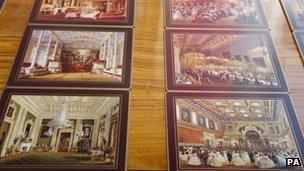UK to name part of Antarctica Queen Elizabeth Land
- Published
- comments
The Queen met members of the Cabinet before the regular meeting began
Part of Antarctica is to be named Queen Elizabeth Land in honour of the Queen, it was announced as she made a historic visit to Downing Street.
She is the first monarch since 1781 - during the US war of independence - to attend a cabinet meeting.
She met ministers, who gave her a set of 60 place mats, to mark her Diamond Jubilee after 60 years on the throne.
The Queen joined the cabinet while they were updated on a range of forthcoming parliamentary business.
After leaving Downing Street she went with Foreign Secretary William Hague to the Foreign Office, where it was announced that the southern part of the British Antarctic Territory had been named.
The territory, covering 169,000 sq miles - almost twice the size of the UK - was previously unnamed, the Foreign Office said.
"This is a fitting tribute at the end of Her Majesty's Diamond Jubilee year, and I am very proud to be able to announce it as she visits the Foreign and Commonwealth Office," Mr Hague said.
The Foreign Office said there was a precedent - there was already a Princess Elizabeth Land in East Antarctica, which was named after the Queen before she took the throne, and in 2006 an unnamed mountain range in the Antarctic peninsula was named the Princess Royal Range in tribute to the Queen's daughter.
At the cabinet meeting, the Queen sat in the PM's usual seat - with Mr Cameron and Mr Hague sitting on either side of her.
It is believed to be the first time a monarch has attended peace-time cabinet since George III in 1781. George I ceased to chair cabinet in 1717.
The Queen's father, King George VI, attended war cabinet during the Second World War.
The cabinet, external, which usually meets weekly, is the group of 20-30 senior ministers who are responsible for running the departments of state and decide government policy
Shorter speech encouraged
After arriving at No 10, the Queen was introduced to each of the government's senior ministers in turn, as they bowed or curtseyed.
She shared jokes with Chancellor George Osborne, Defence Secretary Philip Hammond, and Deputy Prime Minister Nick Clegg.

The cabinet gave the Queen a set of 60 place mats
After the Queen and the cabinet had taken their seats, Mr Cameron formally welcomed her to the meeting and outlined the items of business on the agenda.
It began with Chief Whip Sir George Young talking about the change to royal succession rules, to allow a first-born girl to become head of state even if she has a younger brother.
There were also updates on the forthcoming parliamentary business and Ken Clarke spoke about prospective justice measures.
There was a much larger than usual press pack opposite No 10, although, unlike normal cabinet arrivals and departures, no questions were shouted at the Queen as she arrived and left.
The Prime Minister's official spokesman said during cabinet, the Queen "very gently and humorously, on the section regarding the next Queen's Speech encouraged it to be on the shorter rather than longer side"
'She can come any time'
Communities Secretary Eric Pickles said all Cabinet ministers had ensured their shoes were "shiny, freshly polished - obviously with the exception of Ken Clarke, who wore his customary Hush Puppies".
"The Queen seemed very relaxed, in a very good mood and took an enormous interest in the Cabinet discussion," he told BBC Radio 4's The World At One.
"I think people were perhaps more considered in what they say, but nevertheless it was a proper discussion on the general economic situation and the inflation figures and Afghanistan."
Asked whether she might have enough table mats already before today's gift, Mr Pickles said: "One can never have too many table mats."
He dismissed suggestions from some that the Queen was crossing a constitutional line by attending the cabinet.
"We are her cabinet, we operate for her. She was sat in the seat where the Prime Minister traditionally sits and, given it's her cabinet, she can come any time she wants."
While the Queen is head of state, her involvement in day-to-day political decisions is largely formal.
The prime minister visits her regularly for an audience where he updates her on events, while she is also expected to rubber-stamp ministerial decisions at meetings of the Privy Council.
The Queen plays a central ceremonial role in the state opening of Parliament, when she travels by ornate horse-drawn coach to the House of Lords to read out a speech prepared by ministers unveiling details of their legislative plans.
She also retains the power to appoint the prime minister.
Rodney Barker, professor of government at the London School of Economics, said her attendance at the cabinet was "daft", because "it will mean potentially the Queen will know things she is not supposed to know and hear things she is not supposed to hear".
But Professor Jane Ridley, biographer of Edward VII, disagreed, telling BBC Radio 4's Today it was "testimony of the Queen's ability to elevate the monarchy above politics" that she could attend cabinet.
Former Cabinet Secretary Lord O'Donnell told BBC Radio 4: "I'm sure cabinet want to do this because they want to say thank you. I mean, I've always viewed the Queen as kind-of the ultimate public servant. You think what she's done during her jubilee period and they just want to say thank you."